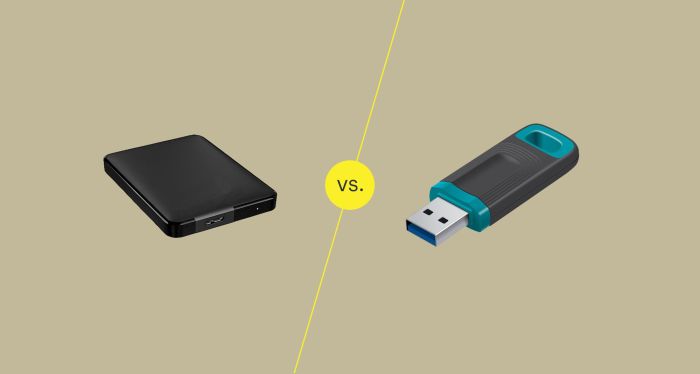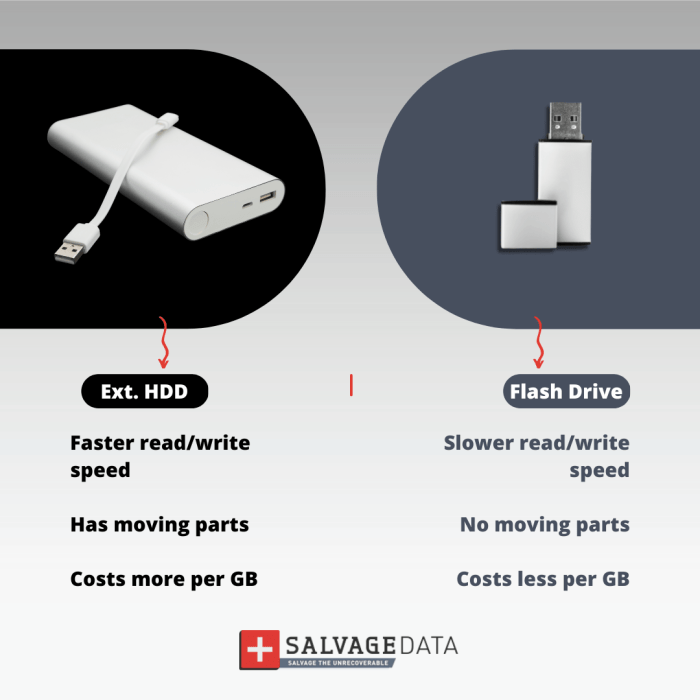In the world of digital storage, flash drives and hard drives are two of the most popular options. But what are the key differences between these two devices? And which one is right for you? Let’s dive into the flash drive vs hard drive debate and explore their features, uses, advantages, disadvantages, and cost to help you make an informed decision.
Flash Drive vs Hard Drive
In the realm of data storage, two prevalent technologies stand out: flash drives and hard drives. While both serve the purpose of storing and retrieving digital information, they differ significantly in their design, features, and applications.
Overview: Flash Drive Vs Hard Drive

Flash Drive: A flash drive, also known as a USB drive or thumb drive, is a compact, portable storage device that utilizes flash memory technology. Flash memory stores data on non-volatile memory chips, enabling it to retain data even without power.
Hard Drive: A hard drive, also known as a hard disk drive (HDD), is a traditional storage device that employs spinning disks coated with magnetic material. Data is stored and retrieved by magnetic read-write heads that move across the spinning disks.
Key Differences, Flash drive vs hard drive
- Size and Portability: Flash drives are significantly smaller and more portable than hard drives, making them ideal for carrying data on the go.
- Speed: Hard drives typically offer faster read-write speeds compared to flash drives, especially for large file transfers.
- Durability: Flash drives are more durable than hard drives, as they have no moving parts and are less susceptible to physical damage.
- Capacity: Hard drives generally provide larger storage capacities than flash drives, ranging from hundreds of gigabytes to several terabytes.
Features
Flash Drives


- Compact and portable
- Durable with no moving parts
- Fast read-write speeds for small files
- Limited storage capacity (typically up to 256 GB)
- USB connectivity
Hard Drives
- Larger storage capacity (typically up to several TB)
- Faster read-write speeds for large files
- Mechanical components, making them more susceptible to damage
- Less portable than flash drives
- SATA or NVMe connectivity
Comparison
| Feature | Flash Drive | Hard Drive |
|---|---|---|
| Size and Portability | Compact, portable | Bulkier, less portable |
| Speed | Faster for small files | Faster for large files |
| Durability | More durable | Less durable |
| Capacity | Limited (up to 256 GB) | Larger (up to several TB) |
| Connectivity | USB | SATA or NVMe |
Usage
Flash Drives


- Storing and transferring small files (e.g., documents, presentations, photos)
- Booting operating systems or running portable applications
- Backing up important data
- Sharing files between computers
Hard Drives
- Storing large amounts of data (e.g., videos, music, games)
- Installing and running operating systems and applications
- Long-term data storage and archiving
- Backing up large volumes of data
Comparison
- Portability: Flash drives are more suitable for portable storage and data transfer.
- Capacity: Hard drives are preferred for storing large amounts of data.
- Speed: Hard drives offer faster performance for demanding tasks like video editing and gaming.
Essential Questionnaire
What is the difference between a flash drive and a hard drive?
A flash drive is a small, portable storage device that uses flash memory to store data. A hard drive is a larger, more permanent storage device that uses spinning disks to store data.
Which is better, a flash drive or a hard drive?
The best choice depends on your specific needs. Flash drives are more portable and durable, while hard drives offer larger storage capacities and lower cost per gigabyte.
How much does a flash drive cost?
The cost of a flash drive varies depending on its storage capacity and brand. Generally, flash drives range in price from $10 to $100.
How much does a hard drive cost?
The cost of a hard drive also varies depending on its storage capacity and brand. Generally, hard drives range in price from $50 to $200.
